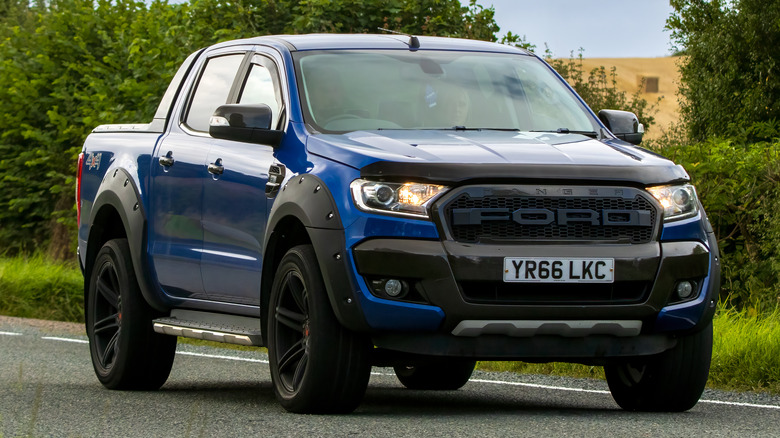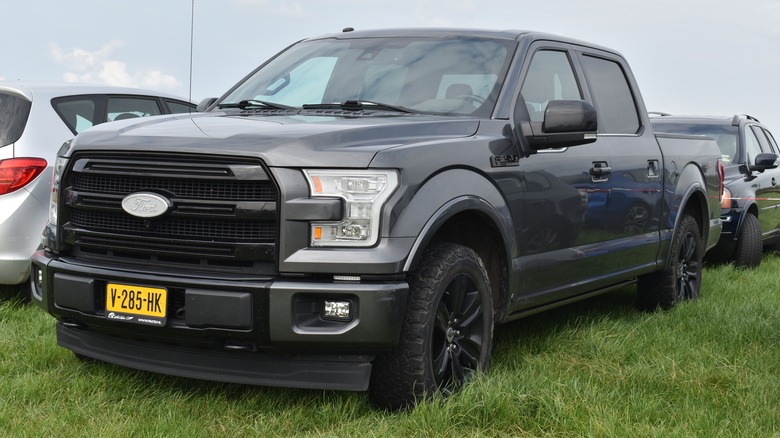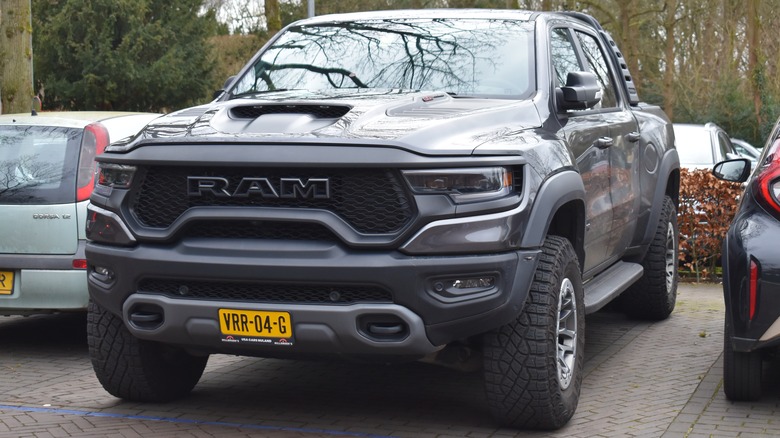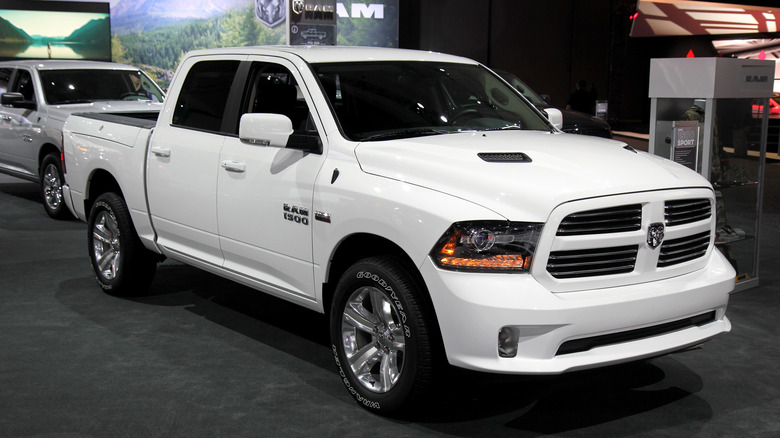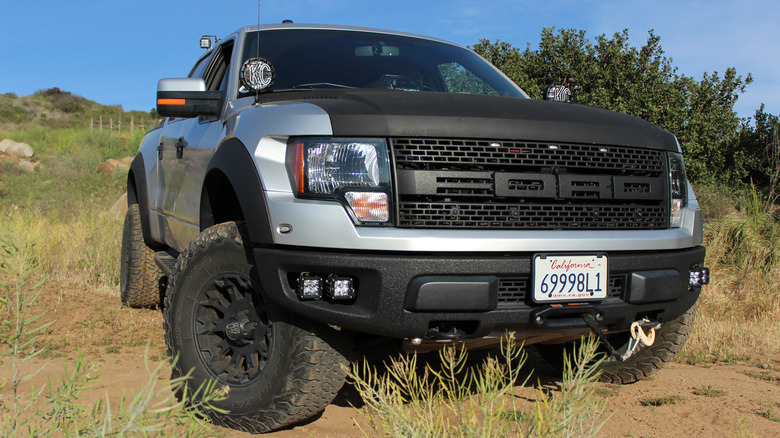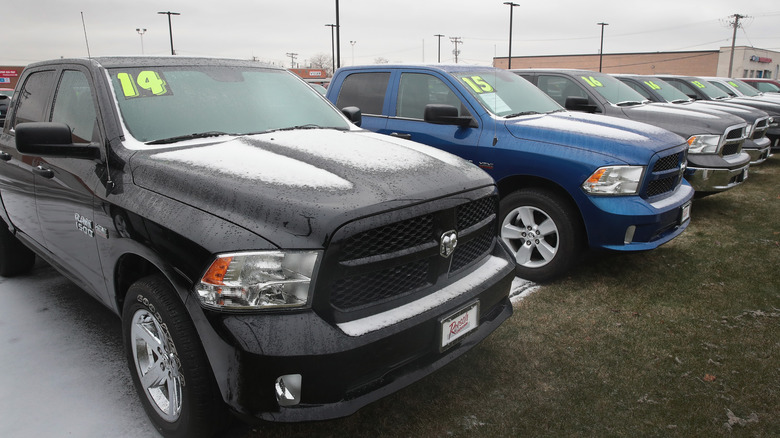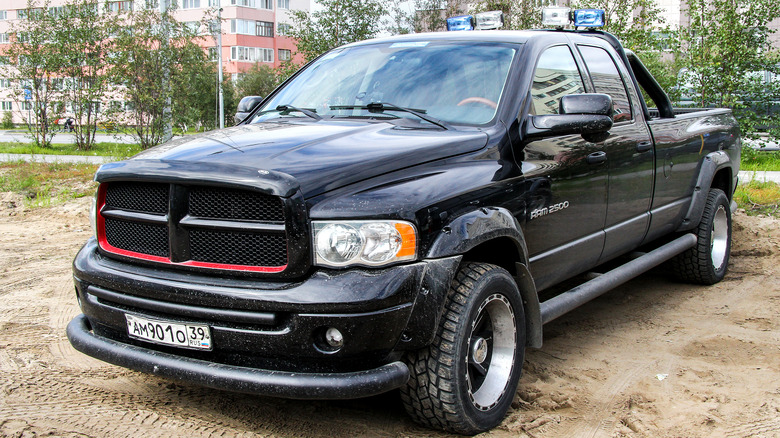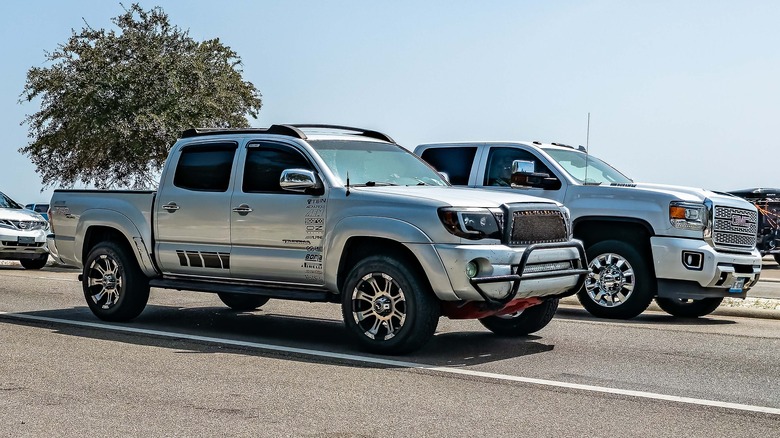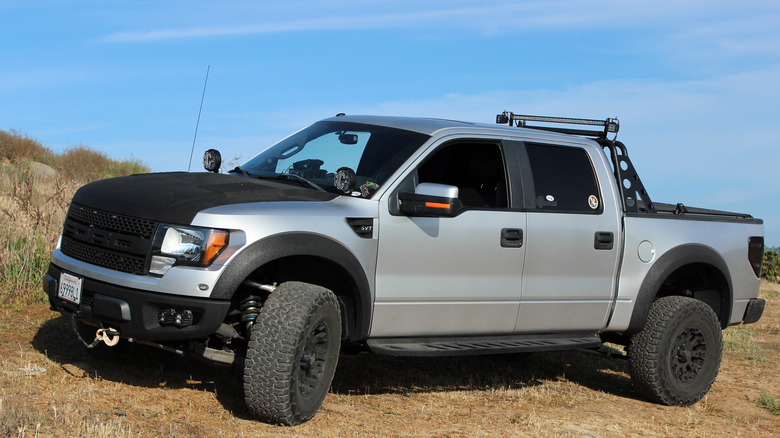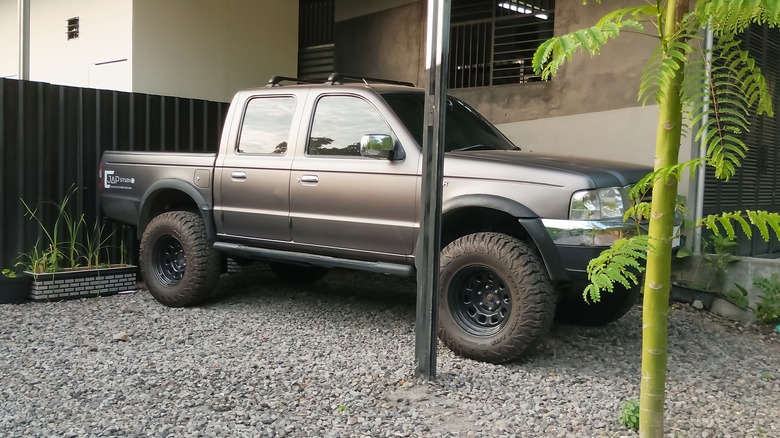9 Of The Biggest Pickup Truck Recalls In The U.S.
Recalls happen to all types of vehicles, and pickup trucks, the workhorses of American roads, are no exception. While many recalls involve minor fixes or precautionary measures, some recalls are massive, costly, and downright dangerous, affecting millions of drivers and their vehicles.
Over the years, the automotive industry has seen recalls ranging from minor inconveniences to life-threatening defects. Ford, Ram, Toyota, and GM — some of the most trusted names in the business — have all faced moments where engineering flaws turned into large-scale crises. These recalls often address safety issues significant enough to catch the attention of the U.S. National Highway Traffic Safety Administration (NHTSA), which works alongside automakers to ensure public safety.
The numbers can be staggering. For example, Toyota's recall of over 1.5 million trucks in 2008 addressed severe frame corrosion that could compromise the structural integrity of its popular Tacoma and Tundra models. And these are just the beginning. Recalls of this scale cost automakers billions, not just in repairs but in the hit to consumer trust.
Pickup truck recalls usually require detailed repairs or vital part replacements, and given the complexity of modern vehicles, these fixes can cost automakers a fortune. While not as frequent as smaller scale recalls, these major cases stand out for their impact, scope, and the lessons they've taught the industry over the years.
Ford F-Series door latch recall
In 2017, Ford issued a recall affecting over 1.3 million F-Series trucks due to a safety issue with the door latches. The problem, which primarily surfaced in colder climates, involved side door latches that could freeze. When this happens, the doors might not open or close properly, and in some cases, they could appear closed but fail to latch securely. This raised serious safety concerns, as a door could unexpectedly swing open while the vehicle was in motion.
The recall covered 2015 to 2017 Ford F-150 trucks as well as 2017 Super Duty models. Ford explained that the issue stemmed from water entering the latch mechanism, freezing, and interfering with proper operation. Although no injuries or accidents were reported at the time, the automaker acted proactively to address the defect and avoid potential risks to drivers and passengers.
Ford's solution involved installing water shields over the door latches to prevent freezing and inspecting the latch cables for damage. Repairs were provided at no cost to owners, ensuring that customer safety remained a top priority – especially for a vehicle lineup as iconic and widely used as the F-Series.
Ram software glitch
Modern vehicles rely heavily on advanced software systems, but when those systems fail, the consequences can be serious. In 2024, Ram faced one of its largest recalls in recent history, pulling back 1.2 million Ram 1500 pickup trucks due to a software defect that could deactivate the electronic stability control (ESC) system.
The ESC system is vital for maintaining vehicle stability during emergencies or slippery conditions. Without it, drivers risk losing control, especially during sudden maneuvers. The issue stemmed from the anti-lock brake system (ABS) control module, as a glitch could cause the ESC and related safety features to shut down. The affected trucks were produced between 2019 and 2024, excluding the 2020 model year. Drivers of impacted vehicles might notice dashboard warning lights indicating the failure of systems like ABS, Adaptive Cruise Control, and Forward Collision Warning. Despite the alerts, core braking systems remained operational.
Ram's parent company, Stellantis, contacted owners in October 2024 and advised them to visit dealerships for a free software update to restore the ESC system. Thankfully, no accidents or injuries related to the defect were reported at the time of the recall.
Fiat Chrysler Automobiles software error
The integration of advanced technology in vehicles has revolutionized driving, but it has also introduced new risks. One of the most alarming examples came to light in 2015, when cybersecurity researchers demonstrated how hackers could remotely take control of a Jeep Cherokee. This eye-opening event revealed a critical vulnerability in Fiat Chrysler Automobiles' (FCA) Uconnect infotainment system, which was capable of allowing unauthorized access to key vehicle functions like steering, braking, and acceleration.
To address this unprecedented safety concern, FCA issued a recall impacting 1.4 million vehicles equipped with the vulnerable 8.4-inch touchscreen Uconnect system. The recall included popular models such as the Dodge Ram 1500, 2500, and 3500 pickups, along with the Jeep Cherokee and Grand Cherokee SUVs from 2013 to 2015.
The fix involved a comprehensive software update designed to block remote access. FCA sent USB drives containing the update directly to vehicle owners, allowing them to install the patch themselves. Alternatively, drivers could visit dealerships or download the update online to secure their vehicles. FCA also implemented network-level security measures to further safeguard against potential cyber-attacks. Thankfully, the company reported no known injuries or accidents related to the hacking vulnerability beyond the controlled demonstrations conducted by researchers.
Ford F-150 seat belt fires
In 2018, Ford issued a recall for approximately two million F-150 pickup trucks, addressing a surprising fire risk linked to the vehicles' seat belt pretensioners. These devices, designed to tighten seat belts during a collision, were found to emit excessive sparks when deployed. Under certain conditions, these sparks could ignite gases released within the B-pillar — the vertical structure between the front and rear doors — and set the cabin insulation or carpeting on fire.
The recall impacted Regular Cab and SuperCrew Cab models manufactured between 2015 and 2018. Ford's internal review revealed a total of 23 confirmed incidents — 17 in the U.S. and six in Canada — of smoke or fire resulting from this defect. Thankfully, no injuries or fatalities were reported, but the potential risk to drivers and passengers was undeniable.
This incident highlighted an unusual safety challenge — one where a system designed to protect occupants inadvertently introduced a fire hazard. Ford took swift action by recalling the affected trucks and providing a solution free of charge. Technicians applied heat-resistant tape to the B-pillars to minimize fire risks and made adjustments to interior panels in some models to ensure further protection. Owners were notified promptly, and dealerships across North America handled the repairs.
Ram tailgates opening mid-drive
A truck owner's nightmare is losing cargo on the road, and that possibility is what prompted Fiat Chrysler Automobiles (FCA) to recall 1.1 million Ram pickup trucks in 2019. The issue? Faulty power tailgate latches that could fail, causing the tailgate to swing open unexpectedly during transit. This created serious safety risks, not only for drivers but also for others on the road who could encounter debris.
The recall affected Ram 1500, 2500, and 3500 models built between 2015 and 2017, specifically those with power-locking tailgates. Trucks with manual locking tailgates or eight-foot beds were not included in the recall. The problem was traced to an internal component within the tailgate latch that could weaken and fracture over time, particularly when subjected to heavy use.
While there were no reported injuries or accidents at the time, the potential for dangerous situations pushed FCA to act decisively. Owners were instructed to avoid overloading their truck beds and secure loose cargo until repairs were made. Dealerships reinforced the tailgate locking mechanisms to prevent future failures, with all repairs covered under the recall.
Ram steering recall
Steering control isn't something any truck owner should ever have to second-guess, yet that's exactly what prompted Chrysler's massive recall of 1.2 million Ram trucks in late 2013. The primary concern centered on the tie rods, which were prone to fracture if installed incorrectly during assembly. Such a failure could lead to a sudden and potentially catastrophic loss of steering control.
The recall predominantly involved 2003 to 2008 Ram 2500 and Ram 3500 models. Additionally, certain 2008 to 2012 Ram 2500, 3500, 4500, 5500 models and 2008 Ram 1500 4x4 Mega Cab trucks were also affected. Chrysler's internal investigation revealed that approximately 453,500 of these vehicles might have been assembled with misaligned tie rods, making them susceptible to fracture under stress.
By the time of the recall, there had been reports of six accidents linked to this defect, two of which resulted in injuries involving Ram 2500 and Ram 3500 trucks. In response, Chrysler announced that dealerships would begin replacing the tie rod assemblies on affected vehicles starting in January 2014.
Toyota frame corrosion
In 2016, Toyota agreed to a $3.4 billion settlement over frame rust issues affecting approximately 1.5 million vehicles. The models involved included the 2005–2010 Tacoma compact pickups, 2007 and 2008 Tundra full-size pickups, and 2005 to 2008 Sequoias. Owners reported severe rusting of the frames, which compromised the structural integrity of these vehicles.
The root cause was attributed to inadequate rust protection during manufacturing, leading to accelerated corrosion, especially in regions where road salt is commonly used. This corrosion posed serious safety risks, including the potential for parts of the frame to fail. Under the terms of the settlement, Toyota agreed to inspect the frames of the affected vehicles and, if necessary, replace them at no cost to the owners.
It's noteworthy that Toyota did not admit to any wrongdoing as part of the settlement. However, the company expressed its commitment to ensuring customer satisfaction and vehicle safety in a statement shared by Motor Trend, where Toyota said: "We want our customers to have a great ownership experience, so we are pleased to settle this litigation in a way that benefits them and demonstrates that we stand behind the quality and reliability of our vehicles."
Ford fuel tank strap corrosion
Ford faced a significant issue in 2011 when 1.2 million pickup trucks were recalled for a corrosion-related defect. The problem revolved around fuel tank straps that were prone to rusting and breaking, particularly in states with heavy road salt use during winters. These broken straps could cause the fuel tank to detach from the truck. This posed a dual risk of fuel spills and potential fires, making the recall a top priority.
The recall affected 1997 to 2004 Ford F-150 and F-250 models, as well as the limited-production Lincoln Blackwood trucks. While the design of the straps had initially been sufficient for most conditions, prolonged exposure to salty roads proved to be a vulnerability. Complaints from drivers about fuel tanks dropping onto the road prompted an investigation and led to this large-scale recall.
To resolve the issue, Ford dealerships replaced the corroded straps with new ones made from a more durable, corrosion-resistant material. In cases where both straps had failed and the fuel tank was damaged, the tank itself was also replaced free of charge.
Ford cruise control switch recall
Ford's reputation for reliability faced another challenge in 2005 when the company recalled 3.8 million vehicles due to a defect in the cruise control deactivation switch. This small but critical component posed a major fire hazard across a wide range of Ford vehicles, including its highly popular F-Series trucks.
The issue was particularly concerning because the faulty switch could overheat and ignite fires even when the vehicle was parked and turned off. This risk extended to some of Ford's most trusted models, including the F-150, Expedition, Lincoln Navigator, and Bronco, produced from the early 1990s through 2002. Reports of underhood fires and smoke raised serious safety concerns for both drivers and nearby property.
To address the issue, Ford implemented a fix that involved installing a fused wiring harness to prevent overheating. Owners were encouraged to bring their vehicles to authorized dealerships, where repairs were performed free of charge. Ford also advised customers to monitor for warning signs such as non-functioning cruise control or brake lights, which could indicate a malfunctioning switch.
